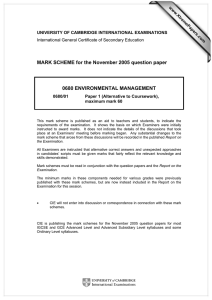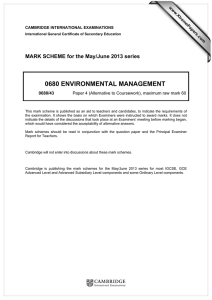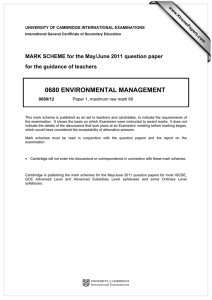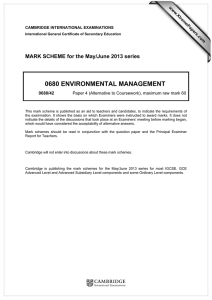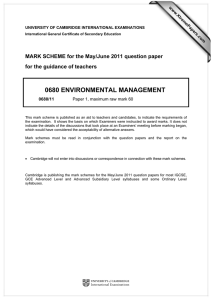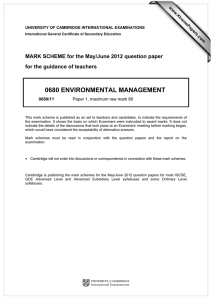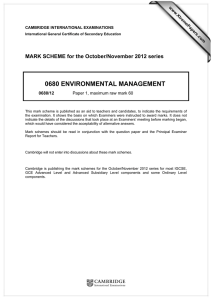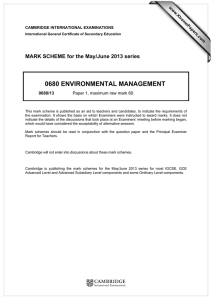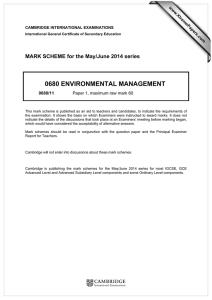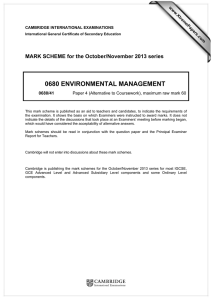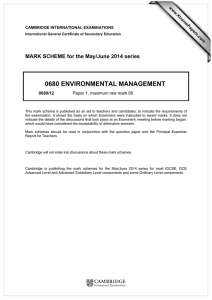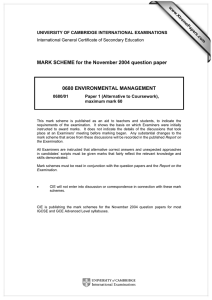0680 ENVIRONMENTAL MANAGEMENT MARK SCHEME for the May/June 2013 series
advertisement
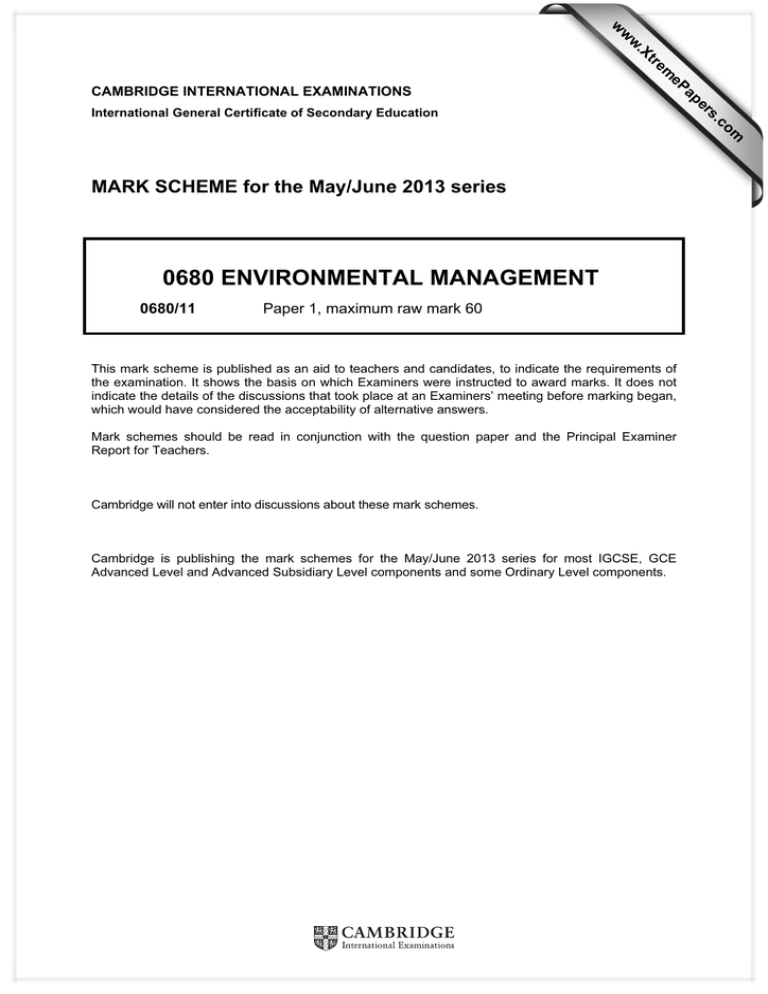
w w ap eP m e tr .X w CAMBRIDGE INTERNATIONAL EXAMINATIONS 0680 ENVIRONMENTAL MANAGEMENT 0680/11 Paper 1, maximum raw mark 60 This mark scheme is published as an aid to teachers and candidates, to indicate the requirements of the examination. It shows the basis on which Examiners were instructed to award marks. It does not indicate the details of the discussions that took place at an Examiners’ meeting before marking began, which would have considered the acceptability of alternative answers. Mark schemes should be read in conjunction with the question paper and the Principal Examiner Report for Teachers. Cambridge will not enter into discussions about these mark schemes. Cambridge is publishing the mark schemes for the May/June 2013 series for most IGCSE, GCE Advanced Level and Advanced Subsidiary Level components and some Ordinary Level components. om .c MARK SCHEME for the May/June 2013 series s er International General Certificate of Secondary Education Page 2 Mark Scheme IGCSE – May/June 2013 Syllabus 0680 Paper 11 General notes Symbols used in Environmental Management mark schemes. / separates alternatives for a marking point – other valid ways of expressing the same idea are also credited ; separates points for the award of a mark [3] indicates the number of marks available italic indicates that this is information about the marking points and is not required to gain credit italic text is also used for comments about alternatives that should be accepted, ignored or rejected ora or reverse argument – shows that an argument from an alternative viewpoint will be credited AW alternative wording, sometimes called ‘or words to that effect’ – AW is used when there are many different ways of expressing the same idea ( ) the word / phrase in brackets is not required to gain marks but sets the context of the response for credit e.g. (nuclear) waste – nuclear is not needed but if it was described as a domestic waste then no mark is awarded volcanic underlined words – the answer must contain exactly this word ecf error carried forward – if an incorrect answer is given to part of a question, and this answer is subsequently used by a candidate in later parts of the question, this indicates that the candidate’s incorrect answer will be used as a starting point for marking the later parts of the question © Cambridge International Examinations 2013 Page 3 1 Mark Scheme IGCSE – May/June 2013 Syllabus 0680 Paper 11 (a) (i) weather atmospheric conditions / over short term / climate over long term; idea of climate = average weather; [2] (i) close to / buried in the ground; [1] (ii) wind direction; [1] (iv) thermometer; shelter from rain / direct radiation / AW; but still allow air circulation; OR barometer; shelter from rain / direct radiation / AW; but still allow air circulation; [3] (b) Q; temperature always high / above 25 °C; rainfall high / >150 mm; [3] [Total: 10] 2 (a) (i) sea birds sand lance storm petrels whales zooplankton basking sharks phytoplankton upwelling nutrients all 5 for (3), 3 or 4 for (2), 2 for (1), 1 or 0 for (0) (ii) warm nutrient poor surface water blown offshore / cold water is allowed to rise here; © Cambridge International Examinations 2013 [3] [1] Page 4 Mark Scheme IGCSE – May/June 2013 Syllabus 0680 (iii) (El Nino) causes warm surface waters to replace cold; which thus hold less oxygen; fish die / migrate; less nutrients; same effect on fish; (b) general idea of loss of species useful to humans; general food chain effect; loss of possible sources of drugs; foods; might need varieties, which gone, when / if climate changes; Paper 11 [3] [3] [Total: 10] 3 (a) better medical care; leading to higher survival of both young and old; better food supply / storage; leading to longer life; better sanitation; leading to higher survival of both young and old; fear of old age; leading to production by couples of large family to look after them; (1) for factor stated, (1) for development (b) (i) correct completion; (light grey = house, mid grey =0) (ii) 11.38/3.7 = 2.99/3; [4] [1] [1] (iii) not go on / go on less holidays; upgrade home insulation; turn off appliances / lights when not wanted; use public transport / walk / cycle; reference to alternative energy a named alternative energy and relevant a person X; [4] [Total: 10] 4 (a) (i) reduced area; relevant comment on shape / extent; (ii) population growth in bordering countries; increased water for domestic use; industrial / farming use; taken out of Jordan river; drainage of lake in southern end; land reclamation; © Cambridge International Examinations 2013 [2] [4] Page 5 Mark Scheme IGCSE – May/June 2013 Syllabus 0680 Paper 11 (b) take shower not bath; more water economical methods of plant watering / e.g.; brick in cistern idea; don’t run taps when not needed; repair leaks; collect rain water for plants etc.; water economical irrigation, trickle drip; [4] [Total: 10] 5 (a) (i) oil; coal; gas; (1) for 1, (2) for all 3 [2] (ii) made from dead bodies of (once) living things; [1] (b) (i) correct plots; [1] (ii) 435 / 300 000 ( × 100); = 0.145 %; [2] (iii) named alternative energy sources introduced (once); provision of incentives for energy conservation / domestic alternative energy usage; taxing energy from fossil fuels to reduce usage; promotion for public transport; afforestation projects; recycling (as long as linked properly to energy saving); [4] [Total: 10] 6 (a) (i) 0.5 + 1.5 + 3.5; 5 %; humus, living organisms are organic; (ii) photosynthesis – water; respiration – air / oxygen; making proteins – minerals ((a) nitrate / sulfur / sulphate); (b) (i) (ii) water which has soaked into ground from (rain / snow / etc.); [2] [3] [1] pollutants from e.g.; storage tanks / septic systems / hazardous waste sites / landfills / road salts / fertilisers / pesticides; [2] (iii) consuming untreated water / water from industrial pollution area; heavy metals / example poisonous / toxic; microbes / example cause disease; [2] [Total: 10] © Cambridge International Examinations 2013
